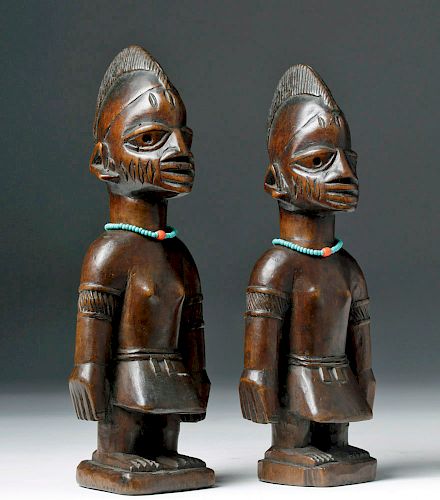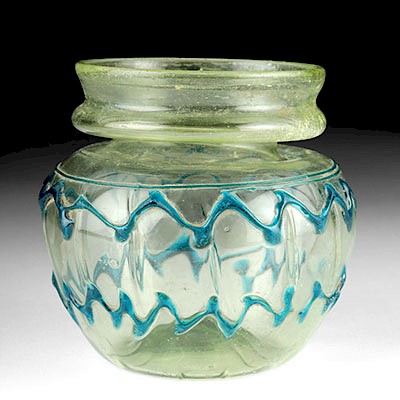Early 20th C. African Yoruba Wood Ibeji Twins (pr)
Lot 223
About Seller
Artemis Gallery
686 S Taylor Ave, Ste 106
Louisville, CO 80027
United States
Selling antiquities, ancient and ethnographic art online since 1993, Artemis Gallery specializes in Classical Antiquities (Egyptian, Greek, Roman, Near Eastern), Asian, Pre-Columbian, African / Tribal / Oceanographic art. Our extensive inventory includes pottery, stone, metal, wood, glass and textil...Read more
Estimate:
$700 - $1,050
Absentee vs Live bid
Two ways to bid:
- Leave a max absentee bid and the platform will bid on your behalf up to your maximum bid during the live auction.
- Bid live during the auction and your bids will be submitted real-time to the auctioneer.
Bid Increments
| Price | Bid Increment |
|---|---|
| $0 | $25 |
| $300 | $50 |
| $1,000 | $100 |
| $2,000 | $250 |
| $5,000 | $500 |
| $10,000 | $1,000 |
| $20,000 | $2,500 |
| $50,000 | $5,000 |
| $100,000 | $10,000 |
| $200,000 | $20,000 |
About Auction
By Artemis Gallery
Aug 16, 2018
Set Reminder
2018-08-16 10:00:00
2018-08-16 10:00:00
America/New_York
Bidsquare
Bidsquare : Clearance Sale - Ancient / Ethnographic Art
https://www.bidsquare.com/auctions/artemis-gallery/clearance-sale---ancient-ethnographic-art-3368
These lots are going, going, gone... plus a nice selection of lots brand-new to auction! Artemis Gallery info@artemisgallery.com
These lots are going, going, gone... plus a nice selection of lots brand-new to auction! Artemis Gallery info@artemisgallery.com
- Lot Description
**Originally Listed At $600**
West Africa, Yoruba culture, Ibeji, ca. early 20th c. CE. A matching pair of deceased female twin figures, known as Ibeji, most likely from Osogbo or the Igbomina region of Yoruba land, carved from an inherently beautiful wood, showing strong detailing particularly in their elaborate coiffures, the scarification marks on their cheeks, and expressive facial features, including wide open almond-shaped eyes with delineated pupils, relatively naturalistic-looking noses, and slightly parted lips as if speaking, singing, or chanting. Both are elaborately decorated with incised armbands, loincloths tied with ornamented belts, and beaded necklaces comprised of sky blue beads with coral hued central pendant beads. Beads were a sign of status and wealth among the Yoruba. A very special pair, quite well cared for! Size: taller figure measures 8.875" H (22.5 cm)
The Yoruba have one of the highest number of twin births in the world, four times higher than in Europe, for example. Ibeji are known to the Yoruba as two people who share one soul. If one of the human twins dies, whether as a child or an adult, the surviving human twin is considered to have little hope of living with only half a soul. In addition, the deceased's soul must have a place to reside. Wooden figures, like this pair, keep the souls of the twins together. When a matched pair of twins is made, it is an indication that both human twins have died. This pair shows dark, smooth surfaces which convey the devotion and respect to the Ibeji spirit. "Ultimately, the surface of an Ibeji measures the object's spiritual value to the caregiver. The response of the Yoruba mothers and caregivers is primarily personal and spiritual, not aesthetic. Even an Ibeji carved by a mediocre artisan can develop a surface reflecting great efficacy to the believer. The wood is worked, fed, oiled, and clothed not so much to fulfill an aesthetic ideal but to fulfill a human needSlight surface wear to coiffures, but overall excellent.Condition
- Shipping Info
-
All shipping is handled in-house for your convenience. Your invoice from Artemis Gallery will include shipping calculation instructions. If in doubt, please inquire BEFORE bidding for estimated shipping costs for individual items.
-
- Buyer's Premium



 EUR
EUR CAD
CAD AUD
AUD GBP
GBP MXN
MXN HKD
HKD CNY
CNY MYR
MYR SEK
SEK SGD
SGD CHF
CHF THB
THB

















